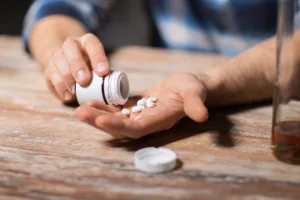
Substance abuse and addiction are topics that are often taboo, difficult to discuss or just downright misunderstood.
Over the years, as research has emerged and new ways of addressing addiction have developed, the reality of this disorder has been brought to light. However, many of the preconceived notions and taboo images still keep a determined grip on the topic.
In order to better understand addiction, and provide help to those experiencing its challenges, it’s crucial to be able to tell the difference between what is an addiction myth, and what is a fact.
The myths and facts of addiction
Increasing one’s understanding of addiction is a first step in being able to differentiate the difference between the truths about addiction and the misconceptions that often accompany the topic.
Myth 1: Drug addiction is a choice
Experimentation may be a choice, but in almost every case, addiction is not.
Fact: There are several factors that come into play when a person develops an addiction, including biological, sociological and psychological factors. Substance use can change your brain chemistry and foster the feeling of dependence on the drug. Addiction develops as a substance negatively impacts your brain, including your decision-making capabilities.
Myth 2: Prescription drugs are safer than illegal drugs
Unfortunately, just because certain drugs come with a prescription label does not mean they are any safer than some illegal drugs. The DEA reports that about 11.5 million people aged 12 or older misuse prescription pain relievers each year.
Fact: Even if they are prescribed by a doctor, any use of a drug outside the doctor’s recommendation (in greater quantities or more frequently than prescribed) is dangerous and could lead to an addiction as severe as those caused by illicit drugs. Some commonly misused prescription drugs include opioids, anti-depressants such as Valium or Xanax, and stimulants such as Ritalin and Adderall.
Myth 3: Those with substance use disorders are bad people
Addiction doesn’t discriminate based on race, socio-economic status, education or any other demographic. It’s not a sign of moral failure. Those that suffer from addiction don’t lack willpower.
Fact: Addiction is a disease that can affect anyone. There are many factors that contribute to addiction. The assumption that someone suffering from substance use disorder doesn’t have good character or is a bad person is unfounded.
Myth 4: Once you detox, you don’t have to do anything else
Receiving treatment through a detox program is the first (and one of the most difficult) steps in recovery. However, the path to wellness does not end once detox is complete.
Fact: Healthy lifestyle choices need to be made after treatment in order to prevent relapse and encourage long-term sobriety. Detox is the first step in the treatment program as it clears the body of toxins left behind by substances; but it is considered the first — not final — step in recovery because a great amount of mental health treatment, self-awareness and “soul-searching” is required for true recovery to take effect.
Myth 5: Rehab costs too much for the average income
This is one of the most widespread and dangerous myths about substance use and one of the biggest reasons why many people do not seek treatment.
Fact: Treatment programs vary in cost and there are programs and payment options available to ease the financial burden of treatment. Not to mention that many treatment programs now accept insurance to some capacity. If you are suffering from an addiction, don’t hesitate to seek help because of your economic status — at least reach out and see what options are available for your situation.
Myth 6: You have to hit rock bottom to get treatment
It is true that if one suffering from substance use does hit rock bottom, receiving immediate treatment and care is vital to preventing long-term (and possibly deadly) effects. However, you don’t need to be a long-time user to receive treatment.
Fact: While some people do need to hit this sort of low to register a wake-up call, some people are open to the thought of treatment before they reach such a severe point. Maybe you’ve noticed some withdrawal symptoms arising; perhaps substance use is having an effect on your work performance. No matter where you are, there’s no such thing as getting treatment too early. In fact, when it comes to addiction treatment, the earlier the better.
Looking to learn more?
At High Focus Centers, we offer intensive outpatient programs for adolescents and adults seeking treatment for substance use. Our expert staff practices holistic methods to help patients overcome addiction and promote long-term wellness. If you or someone you love are suffering from substance use, contact us today or call 800-877-3628 to get the help you need.
Recent Posts
- Why the Holidays Can Be Hard: Grief, Sobriety and Emotional Overload
- Oxygen Keeps Us Alive, but Dopamine Keeps Us Living
- The Rise of Delta 8, Vapes and Legal Highs and Why Outpatient Treatment Still Matters
- How Peer Pressure is Really Affecting Your Teen
- Recognizing When Stress Becomes Too Much: How Outpatient Therapy Helps You Regain Balance



